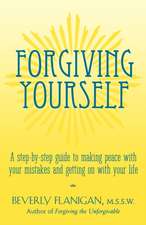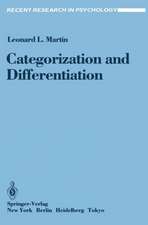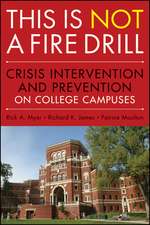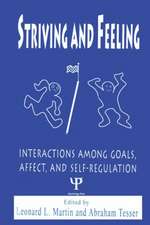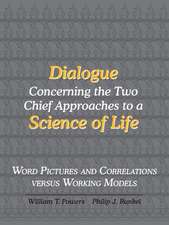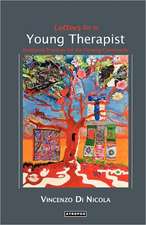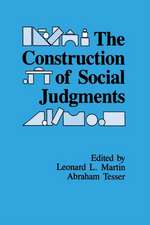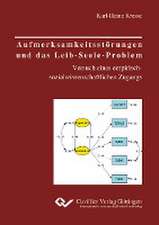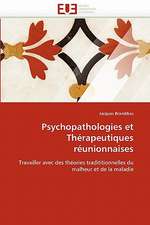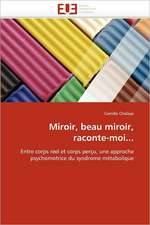House and Psychology
Editat de Ted Cascio, Leonard L. Martinen Limba Engleză Paperback – 13 oct 2011
- Offers a revealing psychological profile of Gregory House and his team
- Uses the latest psychological theory and research to answer questions ranging from "How does House handle addiction?" to"Why does he act like such a jerk?"
- Features contributions from a group of world–renowned psychological experts who also happen to love House
Preț: 105.37 lei
Nou
Puncte Express: 158
Preț estimativ în valută:
20.16€ • 21.05$ • 16.69£
20.16€ • 21.05$ • 16.69£
Carte disponibilă
Livrare economică 14-28 martie
Preluare comenzi: 021 569.72.76
Specificații
ISBN-13: 9780470945551
ISBN-10: 0470945559
Pagini: 326
Ilustrații: Illustrations
Dimensiuni: 152 x 226 x 25 mm
Greutate: 0.45 kg
Editura: Wiley (TP)
Locul publicării:Hoboken, United States
ISBN-10: 0470945559
Pagini: 326
Ilustrații: Illustrations
Dimensiuni: 152 x 226 x 25 mm
Greutate: 0.45 kg
Editura: Wiley (TP)
Locul publicării:Hoboken, United States
Public țintă
Fans of the TV show, House (also known as House, M.D.), fans of Hugh Laurie (Laurie has built up a substantial following from the show), and readers looking for a basic intro to psychology using an approachable pop culture topic.Descriere
Does House use humor to mask his true self?
At what point does an indulgence become an addiction?
Can anything make Taub happy?
How does Cameron′s past affect all of her future relationships?
Why does everyone lie?
Gregory House is a medical genius and a Sherlock Holmesian figure, but he′s also a self–destructive, deeply troubled misanthrope. What is it about this angry, arrogant curmudgeon that is so appealing to us? House and Psychology offers a fascinating psychological profile of Gregory House and his team at Princeton–Plainsboro Hospital. Is House a hero or an antihero? Does Wilson need House′s emotional support? Are all of the relationships on this show doomed to fail? The answers to these questions allow us to appreciate our favorite characters more deeply but also serve as a crystal–clear window into our own behavior. Why do we deceive people? How do we define addiction? Can we help others without expecting anything in return? Combining psychological theory with the latest in psychological research, House and Psychology lets us understand what makes this show tick.
At what point does an indulgence become an addiction?
Can anything make Taub happy?
How does Cameron′s past affect all of her future relationships?
Why does everyone lie?
Gregory House is a medical genius and a Sherlock Holmesian figure, but he′s also a self–destructive, deeply troubled misanthrope. What is it about this angry, arrogant curmudgeon that is so appealing to us? House and Psychology offers a fascinating psychological profile of Gregory House and his team at Princeton–Plainsboro Hospital. Is House a hero or an antihero? Does Wilson need House′s emotional support? Are all of the relationships on this show doomed to fail? The answers to these questions allow us to appreciate our favorite characters more deeply but also serve as a crystal–clear window into our own behavior. Why do we deceive people? How do we define addiction? Can we help others without expecting anything in return? Combining psychological theory with the latest in psychological research, House and Psychology lets us understand what makes this show tick.
Textul de pe ultima copertă
Does House use humor to mask his true self?
At what point does an indulgence become an addiction?
Can anything make Taub happy?
How does Cameron′s past affect all of her future relationships?
Why does everyone lie?
Gregory House is a medical genius and a Sherlock Holmesian figure, but he′s also a self–destructive, deeply troubled misanthrope. What is it about this angry, arrogant curmudgeon that is so appealing to us? House and Psychology offers a fascinating psychological profile of Gregory House and his team at Princeton–Plainsboro Hospital. Is House a hero or an antihero? Does Wilson need House′s emotional support? Are all of the relationships on this show doomed to fail? The answers to these questions allow us to appreciate our favorite characters more deeply but also serve as a crystal–clear window into our own behavior. Why do we deceive people? How do we define addiction? Can we help others without expecting anything in return? Combining psychological theory with the latest in psychological research, House and Psychology lets us understand what makes this show tick.
At what point does an indulgence become an addiction?
Can anything make Taub happy?
How does Cameron′s past affect all of her future relationships?
Why does everyone lie?
Gregory House is a medical genius and a Sherlock Holmesian figure, but he′s also a self–destructive, deeply troubled misanthrope. What is it about this angry, arrogant curmudgeon that is so appealing to us? House and Psychology offers a fascinating psychological profile of Gregory House and his team at Princeton–Plainsboro Hospital. Is House a hero or an antihero? Does Wilson need House′s emotional support? Are all of the relationships on this show doomed to fail? The answers to these questions allow us to appreciate our favorite characters more deeply but also serve as a crystal–clear window into our own behavior. Why do we deceive people? How do we define addiction? Can we help others without expecting anything in return? Combining psychological theory with the latest in psychological research, House and Psychology lets us understand what makes this show tick.
Cuprins
Acknowledgments. Introduction: An Ailment–Free Primer.
Part One. The Good: Unlimited Vicodin.
1. In the Patients Best Interests? Perspectives on Why We Help Others (Ted Cascio).
2. Authenticity in the House: Will the Real House Please Stand Up? (Brian M. Goldman and Samuel J. Maddox).
3. The Creative Side of House: It s the Last Muse on the Right (Lile Jia and Edward R. Hirt).
4. Love, Liking and Lupus: House and Relationships (Lindsey M. Rodriguez and C. Raymond Knee).
5. House and Happiness: A Differential Diagnosis (Nancy L. Sin, Katherine M. Jacobs, and Sonja Lyubomirsky).
6. Not Even Gregory House Is an Island: The Role of Social Support in House (Megan L. Knowles).
7. The Psychology of Humor in House (Arnie Cann and Adam T. Cann).
Part Two. The Bad: Psychological Malpractice.
8. House and Narcissism: Why Are Flawed Heroes Simply Irresistible? (Mark Alicke).
9. Everyone Lies (Bella DePaulo).
10. An Addict, Is an Addict, Is a Defining Addiction (Haran Sivapalan).
11. Rebellion at Princeton–Plainsboro: House and Conformity (Jolanda Jetter and Fiona Kate Barlow).
12. Casting the House Characters on the Values Circumplex (Delroy L. Paulhus & Miranda L. Abild).
Part Three. The Ugly: Is That my EKG?
13. Power in House (Joris Lammers and Anne Brain).
14. House on the Brain (Antoinette Miller).
15. A Hospital Full of People but only Five Personality Dimensions: The Big Five Personality Factors (Peter J. Rentfrow & Jennifer A. McDonald).
16. You Are Not as Special As You Think : The Political Psychology of House, M.D. (Jesse Wynhausen, John T. Jost, and Gregory L. Murphy).
Part Four. The Awe–Inspiring : House Rocks!
17. House: Hero, Anti–Hero, or Just an As#@&!∗ who Likes to Get His Way? (Leonard L. Martin & Matthew Sanders).
Contributors: The Ph.D.s of Princeton–Plainsboro.
Index: Anatomy of a Book.
Part One. The Good: Unlimited Vicodin.
1. In the Patients Best Interests? Perspectives on Why We Help Others (Ted Cascio).
2. Authenticity in the House: Will the Real House Please Stand Up? (Brian M. Goldman and Samuel J. Maddox).
3. The Creative Side of House: It s the Last Muse on the Right (Lile Jia and Edward R. Hirt).
4. Love, Liking and Lupus: House and Relationships (Lindsey M. Rodriguez and C. Raymond Knee).
5. House and Happiness: A Differential Diagnosis (Nancy L. Sin, Katherine M. Jacobs, and Sonja Lyubomirsky).
6. Not Even Gregory House Is an Island: The Role of Social Support in House (Megan L. Knowles).
7. The Psychology of Humor in House (Arnie Cann and Adam T. Cann).
Part Two. The Bad: Psychological Malpractice.
8. House and Narcissism: Why Are Flawed Heroes Simply Irresistible? (Mark Alicke).
9. Everyone Lies (Bella DePaulo).
10. An Addict, Is an Addict, Is a Defining Addiction (Haran Sivapalan).
11. Rebellion at Princeton–Plainsboro: House and Conformity (Jolanda Jetter and Fiona Kate Barlow).
12. Casting the House Characters on the Values Circumplex (Delroy L. Paulhus & Miranda L. Abild).
Part Three. The Ugly: Is That my EKG?
13. Power in House (Joris Lammers and Anne Brain).
14. House on the Brain (Antoinette Miller).
15. A Hospital Full of People but only Five Personality Dimensions: The Big Five Personality Factors (Peter J. Rentfrow & Jennifer A. McDonald).
16. You Are Not as Special As You Think : The Political Psychology of House, M.D. (Jesse Wynhausen, John T. Jost, and Gregory L. Murphy).
Part Four. The Awe–Inspiring : House Rocks!
17. House: Hero, Anti–Hero, or Just an As#@&!∗ who Likes to Get His Way? (Leonard L. Martin & Matthew Sanders).
Contributors: The Ph.D.s of Princeton–Plainsboro.
Index: Anatomy of a Book.
Notă biografică
Ted Cascio writes for the Hollywood PhD blog in Psychology Today. He teaches psychology at Universidad de Deusto in the Basque region of northern Spain.
Leonard L. Martin is a professor of social psychology at the University of Georgia.
Leonard L. Martin is a professor of social psychology at the University of Georgia.

